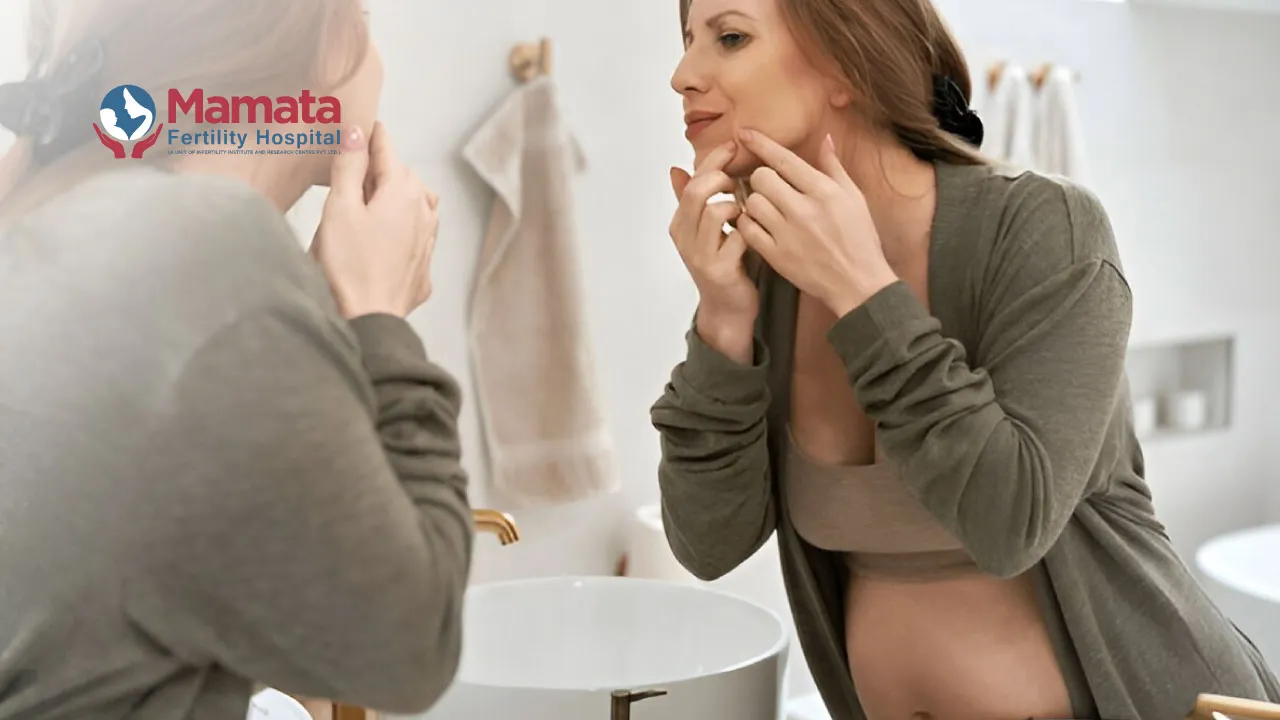Pregnancy is a life-changing experience, but it’s not without its challenges. One of the less glamorous side effects that many expecting mothers face is pregnancy acne. This common skin condition can appear suddenly, leaving women wondering why it happens and how to manage it safely during pregnancy.
If you’re experiencing pregnancy acne or any other skin concerns, experts at Mamata Fertility Hospital Hyderabad, known for offering exceptional pregnancy care in Hyderabad, can help. This article dives into the causes, timeline, and safe treatments for pregnancy acne, so you can focus on preparing for your bundle of joy.
When Does Pregnancy Acne Typically Start?
Pregnancy acne usually begins in the first trimester, often around 6 to 8 weeks. This happens due to sudden and significant hormonal changes in pregnancy. These hormonal shifts result in increased levels of androgens, which stimulate the sebaceous glands to produce more oil (sebum). The excess sebum can clog pores and lead to breakouts.
While some women experience acne only in the early months, for others, it may persist throughout pregnancy or even worsen in the second and third trimesters. However, the onset and severity vary from person to person, depending on factors like genetics and pre-existing skin conditions.
Causes, Symptoms, and Severity of Pregnancy Acne
Causes
- Hormonal Changes in Pregnancy
Increased levels of androgens boost oil production, clogging pores and facilitating acne development.
- Weakened Immune System
Pregnancy suppresses the immune system slightly to support the growing fetus, which can exacerbate acne.
- Stress and Fatigue
The physical and emotional changes during pregnancy might elevate cortisol levels (stress hormone), worsening breakouts.
- Changes in Skincare Products
Many women adjust their routines during pregnancy, and certain products might trigger acne if they are not pregnancy-safe.
Symptoms of Pregnancy Acne
- Red, inflamed bumps or pustules, especially on the face, chest, and back.
- Blackheads and whiteheads on areas prone to oil buildup.
- Skin may feel greasy or appear rough due to inflammation.
Severity Levels
- Mild Pregnancy Acne: Occasional blemishes or spots that clear up quickly.
- Moderate Acne: More frequent breakouts involving inflammation of multiple areas.
- Severe Acne: Painful cysts and large red patches that might require medical treatment.
Understanding the unique characteristics of pregnancy acne can help guide skincare decisions and treatment approaches.
Practical Skincare Tips and Safe Treatments During Pregnancy
Managing pregnancy acne requires a gentle, consistent routine and the use of pregnancy-safe products. Below are some effective strategies:
Skincare Tips for Pregnancy Acne
- Gentle Cleansing: Use a mild, non-comedogenic cleanser twice a day to remove excess oil without over-drying your skin.
- Avoid Harsh Scrubbing: Scrubs and harsh exfoliants can irritate sensitive, acne-prone skin.
- Hydration is Key: Keep your skin hydrated with a non-greasy moisturizer. Dehydrated skin often compensates by producing even more oil.
- Use Sunscreen: Choose a broad-spectrum sunscreen to prevent pigmentation (common with acne). Look for one labeled safe for pregnant women.
- Don’t Pick or Pop Pimples: Doing so can lead to scarring or inflammation.
Safe Acne Treatments for Pregnant Women
Consult your doctor before using any treatments. Some safe options include:
- Topical Azelaic Acid: Effective for reducing acne and redness while being gentle on the skin.
- Benzoyl Peroxide (in Moderation): Safe in small amounts but always seek professional advice first.
- Natural Remedies: Aloe vera and honey masks have mild anti-inflammatory benefits.
Avoid retinoids, salicylic acid products, and chemical peels unless they are explicitly pregnancy-approved, as these can harm the baby.
Common Concerns About Pregnancy Acne
Does Pregnancy Acne Indicate a Baby Boy or Girl?
This is a common myth! Some believe acne indicates a girl due to hormonal differences, but there’s no scientific evidence supporting this. Pregnancy acne is caused by hormonal fluctuations, not the baby’s gender.
Will Pregnancy Acne Last the Entire Term?
While some women notice improvements in the second trimester, others may deal with acne until delivery. After childbirth, as hormone levels stabilize, the skin often clears up naturally.
Can Pregnancy Acne Get Worse with Stress?
Yes, stress increases cortisol levels, which can trigger further oil production and lead to a worsening of acne. Practicing relaxation techniques such as prenatal yoga or meditation can help reduce stress levels.
Is It Okay to Wear Makeup During Pregnancy Acne?
Yes, but choose non-comedogenic and mineral-based makeup to avoid clogged pores. Always remove makeup thoroughly at the end of the day.
Key Points
- Pregnancy acne often starts around 6–8 weeks due to hormonal changes.
- Androgen hormones boost oil production, clogging pores and causing breakouts.
- Symptoms range from mild pimples to severe cystic acne on the face, chest, and back.
- Safe treatments include gentle cleansing, hydration, and natural remedies like aloe vera.
- Pregnancy acne doesn’t reveal the baby’s gender but often clears up post-pregnancy.
Conclusion
Pregnancy acne is a natural reaction to the many changes your body undergoes while nurturing a baby. With the right care, you can manage breakouts without compromising your or your baby’s health. For personalized skincare advice, trusted treatments, and the best prenatal support, consult the specialists at Mamata Fertility Hospital Hyderabad, known for exceptional pregnancy care in Hyderabad.
Book your consultation today for expert guidance on managing pregnancy-related skin problems and ensuring a healthy pregnancy!




